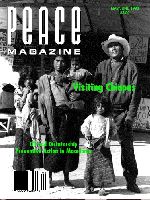
Peace Magazine May-June 1998, page 23. Some rights reserved.
Search for other articles by Kevin Shimmin here
Since the official commencement of the civil war in 1983, the people of Sri Lanka have helplessly watched between 60,000 and 100,000 unarmed civilians die at the hands of the Sri Lankan Army, the Indian Army, and the Liberation Tigers of Tamil Eelam (LTTE). Nearly one million displaced civilians live as internal refugees within their country. Though its economy formerly was one of the strongest in Asia, Sri Lanka now stands in poverty, having spent close to 25% of its Gross Domestic Product on war each year. The LTTE continue fighting for a separate homeland in the north and east of Sri Lanka, having gained control of large areas in predominantly Tamil-speaking regions. While the Tigers use surprise attacks and bombings as their main weapon, the state's Security Forces often respond with reprisal attacks on civilians. In a conflict where both government and guerrilla forces are responsible for human rights atrocities, it is often difficult to discern the truth.
The prospect of political settlement of the conflict seems far off. Human rights violations today pervade state military and guerrilla forces. If a ceasefire and a framework for negotiations is to be achieved, fundamental changes are necessary. First, the Devolution Proposals, a plan by the Sri Lankan government to grant limited autonomy to the Tamil population in the north and east, lacks a real commitment toward empowering minorities politically. The domination of the Sinhalese Buddhist state remains. However, despite its inadequacies, a peaceful political solution must be encouraged. In fact, progressive reform of the Proposals remains a viable alternative, so long as the LTTE and the government are ready to abandon their immovable positions in the ethnic conflict. Sadly, the recent ban on the Tigers by President Kumaratunga has technically shut the door for further negotiations.
Second, any resolution to the war, short of complete annihilation by one side or the other, must involve all parties to the conflict at every step of the way. A ceasefire cannot depend on immediate disarmament. This is simply unrealistic; neither the LTTE nor the government will agree to such conditions.
Third, the establishment as a whole will have to be radically changed. The military and administrative institutions of the state must be purged of their ingrained reliance on racism and suppression. Independent investigations into all human rights abuses must be implemented by commissions having the full support of the international community. These must bring perpetrators to justice and take preventive measures against further atrocities. Future generations of Tamils must have a political voice in an environment free of violence and discrimination. The LTTE must put down their guns, not necessarily in surrender, but in recognition that Tamils who do not support the Tigers also have a right to represent their own community.
Fourth, foreign governments have an important role to play. They can make themselves available in the mediation process. But this will be respected by Sri Lankans only if these governments first do some housecleaning of their own. World leaders have a duty to condemn the human rights atrocities of the Sri Lankan government and the LTTE. Foreign governments have a responsibility to stop Tiger drug peddling and extortion within their own borders, while simultaneously pressuring the Sri Lankan government to stop brutalizing the civilian population.
Finally, as international citizens and as caring individuals, we must insist to the journalists and politicians of the Western world that we have an urgent need and right to know what is happening in Sri Lanka today and what has painfully been forgotten yesterday. Governments must be pressured to stop providing the Sri Lankan state with the means to wage war. Fundraising by the LTTE abroad and at home must be stopped, for only then will their murderous rampage end. Peace activists cannot be caught blindly supporting one side of violence or the other. If Sri Lankans have the courage to face the forces of repression despite personal persecution, surely we can do our part.
Kevin Shimmin worked with human rights activists and trade unions in Sri Lanka for one year. He is now at the Peace Research Institute Dundas.

Peace Magazine May-June 1998, page 23. Some rights reserved.
Search for other articles by Kevin Shimmin here